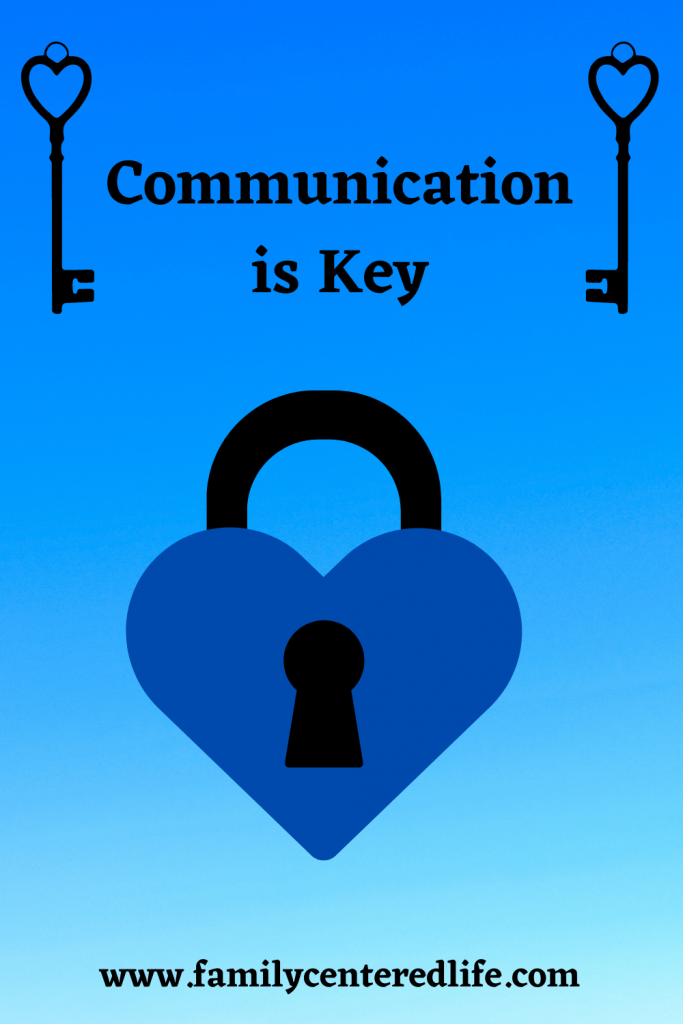
We all need communication skills and we all have communication skills, but what kind of communication skills do we use?? Do we use good communication skills? Do we make good eye contact? Use “I” statements to express our thoughts and feelings? Actively listen to the person we are speaking with? Do we flip through social media on our phones? Yell at the other person? Only talk about ourselves and our opinions?
My guess is that all of us typically fall somewhere in between these extremes of communication styles. However, most people strive to use good communication skills all of the time to express ourselves and our opinions. We want to get our point across. We want to ensure people understand what we are saying and build personal relationships or business relationships with others.

Communication Skills
The following are a few key concepts to help strengthen your communication skills:
“I” statements: Express yourself in the first person. “I feel” this way or “I believe” that or “I wish” this. Using “I” statements opens communication opportunities because it does not blame others. (ex. I’m angry because you forgot to do the dishes vs. You make me mad because you forgot to do the dishes) For most of us it is easier and less stressful to have conversations when we are not blamed or fussed at
Feeling words: Make sure to use correct, specific feeling words. For example, “upset” could mean angry, sad, or anxious. Choosing the word that best describes your feelings or the situation makes communicating your feelings more clearly and leaves less room for misinterpretation.

Respect others: Speak in a rational tone of voice, without yelling or name-calling.
Keep your tone of voice in mind: Tone and volume of your voice can make a world of difference and give your words very different connotations, such as sarcasm or “raising my voice.” (However, “raising my voice” is not typically a positive communication method unless the house is on fire or someone is about to walk in front of a moving vehicle)
Tell the truth: Always be open and honest when communicating with others. This will make sure all relevant and necessary information is out in the open and will teach the other person you are true to your word and mean what you say.
Take turns speaking: Do not monopolize the conversation. Ask the other person about his or her ideas, wants, or needs, depending on the topic at hand.
Speak clearly: Make sure your words are enunciated and the person you are speaking with can understand you and hear your words.
Clarify if someone misunderstands what you say: Do not become annoyed when someone asks you to clarify. Take a deep breath and try rewording your statement or question in a slightly different way. (Remember—if they were not interested, they would not be asking you to clarify!)

Non-verbal communication skills: Make appropriate eye contact. Do not stand too close or too far away. Face the person you are speaking with. Do not be distracted by other things, such as social media scrolling on your electronic device.
Active Listening: Fully participate in the conversation. Listen to what the other person has to say. Respond to them and communicate with them. Interact in an appropriate and respectful manner. Use non-verbal communication skills, such as appropriate eye contact, to show you are actively listening.


Further Information
One of the best handouts I have found for my clients is the Family Communication Skills handout from Skills Training for Children with Behavioral Disorders: A Parent and Therapist Guidebook by Michael L. Bloomquist. This handout gives excellent examples of the “DOs” and “DON’Ts” for communication skills. For example, DON’T hop from topic to topic. DO stay on topic. Communication tips are simple and easy to follow. They are great examples of good communication styles.

For additional information, check out my ebook (How Many Times Do I Have to Repeat Myself?)! It addresses parenting skills, relationship building, and additional positive communication skills. It’s available in paperback and for Kindle on Amazon! Check out the link below!


Using Your New Skills
Now that we have defined several good communication strategies, it is time to make opportunities to utilize your new (or renewed) communication skills! One of the key factors in communicating with others is being available for communication.
Parents are often busy and tired. However, being available for communication means that you may have to stop what you are doing. Even if you were almost done or just got started on that task you need to focus on what your child or spouse has to say. This includes the four-year-old who wants to tell you about the dandelion they just found outside. When you are available for small things, your child or significant other learn you will be available for the big, scary things too.

Other ways to establish opportunities for good communication can be scheduled and planned out. Have family meals together! Be present and limit distraction! Turn off the electronics for mealtime and focus on your family! Mealtime allows everyone to be at the same place at the same time, doing something everyone needs and enjoys (eating)!
Opening up opportunities to talk about the day’s events, upcoming plans, and anything and everything else is good for everyone. However, it is also important to have one-on-one time with each person in the household as well.


One-on-one Time
Spend one-on-one time with each person in your household on a regular basis.
This sets the time for good communication, as well as for enjoyment and bonding. Spend 5 to 15 minutes with each member of the family at bedtime. Talk about their day! What they liked and what they did not like. Go on dates with your children. Allow them to pick the place or activity.
It’s best to give the child a limited number of choices to pick from, otherwise, you may live in Alaska and they may ask to go to Disneyland for the afternoon. This also allows parents to learn about their child’s likes and dislikes and to show each child they are individually important.

One-on-one time may take more effort when children are younger. However, it tends to get easier as children become more active in extracurricular activities. You can utilize those extracurricular activities to have one-on-one time. Stop for dinner with your daughter between soccer practice and dance lessons on Tuesday nights! Play in the park with your son while your daughter is at swim lessons!
This is just one example of creative parenting! Creativity and time management are such important aspects to parenting, and ones no one usually tells you about before you have kids!

Don’t Forget to Communicate with Your Partner Too!
While focusing on the children’s wants, needs, and building relationships with them, don’t forget about your partner (spouse, co-parent, significant other, baby-daddy or baby-mama, whomever your partner is). Your partner is important too and likely to be your main support for dealing with the stresses of life and parenting.
Make sure you get one-on-one time with your partner, as well as with your children. This is beneficial for you, your partner, and your children because you are able to refuel and refresh to deal with whatever life struggle comes next. For more information about spending time with your partner check out this article.


TAKE AWAY
- We all use verbal and nonverbal communication skills and we all have room for improvement
- Use techniques such as active listening, modulating your tone of voice, using correct feeling words, and using “I” statements to help ensure you are communicating all necessary and relative information to the person with whom you are speaking
- These communication skills work with your family, children, spouse, parents, coworkers, supervisors, check-out person at the grocery store, anyone!
- Don’t forget to make time with your family to use those good communication skills you have!
For more ideas about activities to do with your family check out our free downloads! 106 things to do when your child says “I’m bored” and three pages worth of Kids Eat Free nights across the US!
Not only do I love to travel, I also love being active with my family! Check out my parenting book. I’m a mom of seven and a clinical psychologist, so I have lots of great tips to share!




